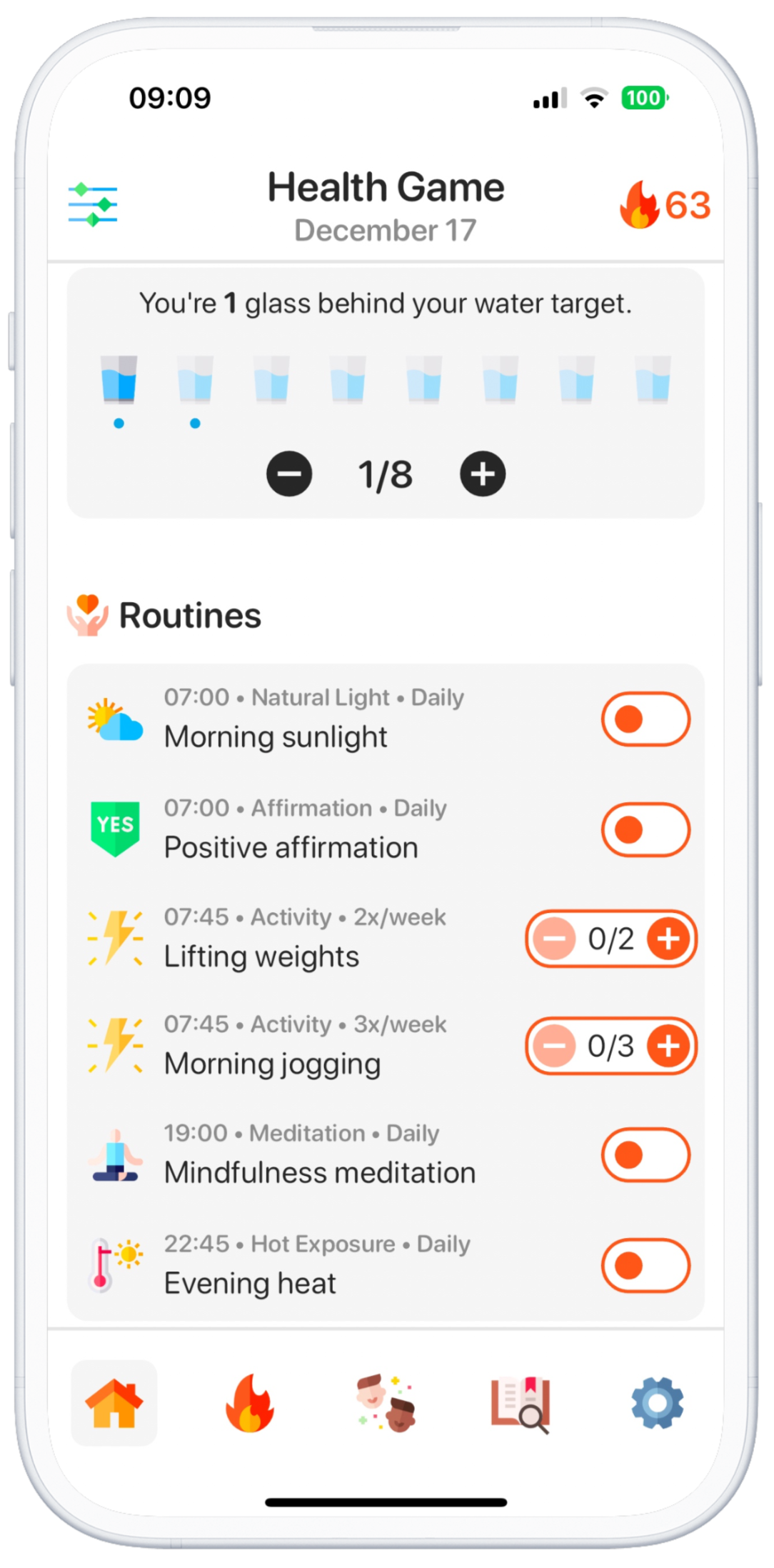11 listopada, 2024
In today's fast-paced world, maintaining a healthy lifestyle can be challenging, but small things can actually make a big difference.

Discover evidence-based strategies to transform your daily habits and achieve optimal well-being, vitality, and longevity. In this article you will learn how to optimze your sleep, which oils use for coocking, when to drink water and many more.
Practicing moderation by eating until you're 80% full, a concept known as Hara Hachi Bu in Okinawan culture, can aid in weight management and promote longevity. By avoiding overeating, you reduce calorie intake, which is linked to a lower risk of chronic diseases and improved metabolic health. Research suggests that mindful eating and caloric restriction without malnutrition can enhance metabolic processes and support healthy aging.
Avoid distractions like scrolling through social media or watching TV during meals. Mindful eating enhances your awareness of hunger and fullness cues, leading to healthier eating behaviors and better digestion. Sharing meals with family and friends not only strengthens social bonds but also contributes to emotional well-being. Studies have shown that social eating can improve mood and promote healthier food choices.
While staying hydrated is essential, consuming large amounts of water during or immediately after meals can dilute digestive enzymes, potentially hindering proper digestion. Waiting at least an hour after eating to drink fluids may support more efficient digestion. Additionally, opting for mineral-rich water with electrolytes can enhance hydration. Adding a pinch of rock salt or mixing water with pure coconut water can replenish essential minerals lost through sweat and daily activities. Starting day with a glass of water is great for your body. However, try to not drink fluids to late to not get disturbed at night. Health Game can assist by offering hydration tracking that ensures an even distribution throughout the day.
Avoid frying foods in vegetable oils, including olive oil, at high temperatures, as this can lead to the formation of harmful compounds due to oil oxidation. Consuming these oils cold, such as in dressings or dips, preserves their nutritional properties, including beneficial antioxidants and healthy fats. For cooking, use oils with higher smoke points like avocado oil or ghee to minimize the production of undesirable compounds.
Engaging in regular physical activity boosts cardiovascular health, strengthens muscles, and enhances mood. Aim for at least 150 minutes of moderate-intensity exercise per week, including activities like brisk walking or swimming, and at least 75 minutes of intense exercise like running or lifting weights. Exercise reduces the risk of chronic diseases such as diabetes, hypertension, and certain cancers. According to the World Health Organization, physical inactivity is one of the leading risk factors for global mortality. Health Game will motivate you to be active every day by providing tools based on gamification, automatic calorie tracking, and customizations.
Quality sleep is essential for cognitive function, emotional well-being, and physical health. Adults should strive for 7–9 hours of uninterrupted sleep per night. Adequate sleep supports immune function, regulates hormones, and is linked to a lower risk of obesity and heart disease. Sleep deprivation has been associated with increased appetite and calorie intake, contributing to weight gain. Sleep is such an essential topic that it truly deserves an entire article dedicated to it. However, here are some practical tips to help you optimize your sleep:
Chronic stress can have adverse effects on your health, contributing to anxiety, depression, and physical illnesses. Incorporate stress-reduction techniques such as meditation, deep-breathing exercises, yoga, or mindfulness practices into your routine. These activities can lower cortisol levels and improve overall mental health. Research indicates that regular mindfulness practice enhances emotional regulation and resilience. Use our routines to incorporate these practices into your everyday life.
Consume a variety of fruits, vegetables, whole grains, lean proteins, and healthy fats. Whole foods provide essential nutrients and antioxidants that protect against diseases. Diets rich in plant-based foods and healthy fats, like the Mediterranean diet, are associated with reduced risk of cardiovascular disease and improved longevity. Incorporating omega-3 fatty acids from sources like fish and flaxseeds supports brain health and reduces inflammation. If you eat carbs, try eating them for dinner to boost serotonin secretion, a neurotransmitter that plays a key role in regulating mood and sleep.
Health Game is a powerfull tool that you can use to create the perfect routine for optimizing your health and building habits.
